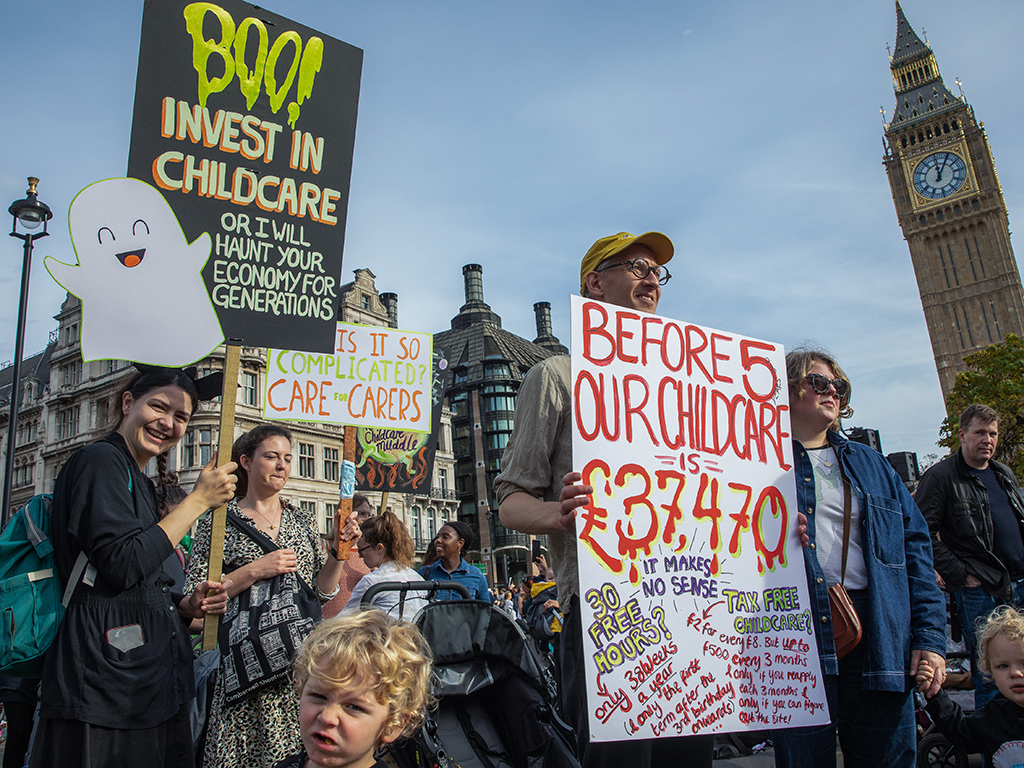
Almost a fifth of parents have been forced out of their jobs by the cost of paying someone else to look after their children while they work, and the UK has the third-highest childcare costs in the OECD group of countries (according to one measure). And yet – despite government subsidies – childcare doesn’t seem to be a lucrative business. The number of providers has fallen by 14 per cent since the pandemic, and the people running it remain woefully underpaid: one report by the Social Mobility Commission found the average wage for an early-years worker is just £7.42 per hour, more than 20 per cent below the UK’s minimum wage.
Despite the failed market for childcare, Rishi Sunak’s first decision of 2023 was to abandon plans for vital reforms to the sector. The plans, which had included increasing child-to-staff ratios and funding for 20 extra hours’ free childcare for three- and four-year-olds, were widely acknowledged as one of the few ideas introduced during Liz Truss’s 49-day premiership that seemed workable and popular. Average UK nursery costs are now about £936 a month, just under a quarter of an average couple’s income.
It is claimed the planned reforms would have “cost billions” – which fails to account for the billions that a dysfunctional childcare sector already costs the UK. A study by the Institute for Public Policy Research (IPPR), published last month, found that a “universal childcare guarantee” would increase earnings by £13bn a year and generate £8bn a year for the Treasury, benefiting those on the lowest incomes the most.
The UK continues to struggle with a problem that appears to have been solved in other countries. In Sweden, where by 2015 the government was spending £8,178 per child on early childhood education, all children are guaranteed a place at a public pre-school and childcare costs are capped at 3 per cent of salaries; in Norway, the government was spending £8,713 per child and kindergarten fees are capped at 6 per cent of household incomes. In those countries, women’s participation in the labour force is 62 per cent and 60 per cent respectively, according to the World Bank, compared with just 58 per cent in the UK (where, incidentally, government spending on early childhood education was just £2,828 per child). It doesn’t take an economist to point out that a four percentage point rise in the number of working women would be transformative for a labour force that is currently stretched to its limit.
Lauren Fabianski, head of campaigns at Pregnant Then Screwed, told me Canada is a good example of the direction the UK could take. In April 2021, Canada announced a C$30bn (£18.3bn) investment in its early-years childcare sector, which will cap costs at C$10 a day, to help the country “punch our way out of the Covid recession”, according to its finance minister. “They made this decision,” said Fabianski, “because it makes economic sense. Following a trial run in Québec, they found that for every dollar they invested in childcare they got between C$1.50 and C$2.80 back into the wider economy through increased employment.” In the UK, the same policy could by the same measure benefit the economy by £30bn or more.
Still more baffling is the fact that the UK appears to hold childcare in such low regard. In other countries – where it is much cheaper – the role of child carer appears to be much more prestigious: in France, Germany, Denmark, Norway, Iceland, Sweden and Finland, a master’s or bachelor’s degree or a teaching qualification is required to work at an early-years setting. In the UK and the US, by comparison, the role often goes to school leavers with no secondary qualifications (hence the low wages).
So the UK’s nurseries have cheap staff, subsidised customers and very similar staff-to-child ratios to other countries. This suggests they should at least be easy to turn a profit from, and private equity companies seem to agree. According to the property firm Christie & Co, the number of nurseries sold in the UK rose 50 per cent in the first half of last year, while the largest 20 nurseries have increased their capacity by almost 40 per cent since 2016.
And yet, as in the care home sector, the financial model of private equity ownership (which typically involves buying things with large amounts of debt) may not sit well with the organisational model needed to provide stable, reliable care. A report published last year by UCL warned that “large, private for-profit companies are heavily indebted, and their risky financial operating models could threaten the provision of nursery places”. A quick look on Companies House at the finances of the UK arm of one of the biggest investors in the nursery sector, the US-based Bright Horizons, shows that while revenues rose to £169m in 2021 from £129m the year before, debt repayments also rose significantly: from £81.2m to £113.8m. With a wage bill of £104m (down from £113.2m, after it cut more than 1,000 positions among its nursery staff), the company spends more on finance than it does on people.
The problem of poor childcare funding is generally regarded as a female issue, but in the context of the UK’s floundering economy, it’s an everyone issue. Better funding would allow more women to work; more women working would raise more tax and improve wellbeing for everyone. Campaign groups such as Pregnant Then Screwed have recognised this – the likes of Sunak have, clearly, not. At least campaigners can be relied upon to fly the flag for struggling families. Fabianski pointed out that 15,000 families took to the streets during the recent March of the Mummies protest. “We won’t be ignored, and we won’t stop until the government commits to the provision of affordable, good-quality childcare and early-years education for all,” she insisted.
[See also: Rishi Sunak can’t get away with neglecting childcare]





